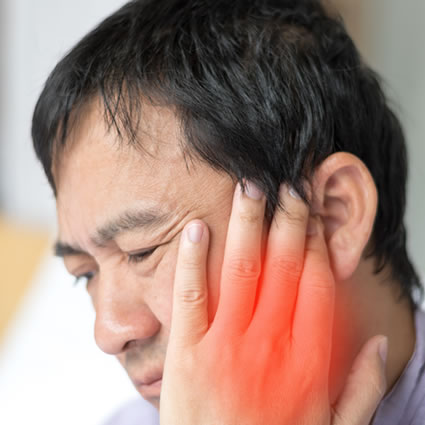What’s causing Your Pain
 Many of us experience some form of headache as a result of different causes: mental and physical stress, imbalanced posture, repetitive overuse of muscle. But one factor that is commonly undiagnosed is the Temporomandibular Joint (TMJ). According to the International Headache Society, tension-type headaches rank as the second most common cause of chronic disease and injury globally. Therefore, it is easy to see how a quick search for causes of headache can be written off as something other than TMJ-related pain.
Many of us experience some form of headache as a result of different causes: mental and physical stress, imbalanced posture, repetitive overuse of muscle. But one factor that is commonly undiagnosed is the Temporomandibular Joint (TMJ). According to the International Headache Society, tension-type headaches rank as the second most common cause of chronic disease and injury globally. Therefore, it is easy to see how a quick search for causes of headache can be written off as something other than TMJ-related pain.
Signs of TMJ Dysfunction
The TMJ is a region responsible for motor movement throughout our entire day, including breathing, talking, and chewing. These can be considered repetitive motions that can lead to both Temporomandibular Disorders (TMD) and Temporomandibular Headache. The American Migraine Foundation describes TMD as pain and tenderness of chewing muscles, joint sounds with jaw opening, and limited jaw movements. Such limited function can result in recurrent pain in the head and face regions, and may or may not be associated with other disorders such as Osteoarthritis, TMJ subluxation, or joint hypermobility. Common muscles associated with TMJ pain and dysfunction include the Temporalis, Masseter, the Pterygoid group.
Getting Help
The American Dental Association (ADA) recommends a complete evaluation to determine how best to treat TMJ dysfunction. Your dentist may check joints and muscles for pain and tenderness, clicking, popping or difficulty moving. Medical history, X-Rays (sometimes specialized) may be required to fully understand the condition. Treatment may happen in steps, and depend on the doctor’s diagnosis and ability to help you find the best treatment options. ADA also recommends a “less is often best” approach to care, including self-care and/or a change in habits that may include:
- minimizing extreme jaw motions (yawning, yelling, singing)
- avoiding hard foods, choosing softer foods
- avoiding chewing gum
- practicing relaxation and breathing techniques
In some cases, your doctor may recommend:
- pain/inflammation reduction medication
- jaw strengthening exercises
- night guard to reduce clenching/grinding of teeth
How Chiropractic Care Can Help
Chiropractors are trained in assessing and treating dysfunction of the nervous, skeletal and muscular systems. Much of our treatment revolves around restrictive movements of the body. The TMJ is a mechanical joint that also utilizes these 3 systems. Chiropractors can help patients improve joint mobility and reduce muscle tension, thus reducing pain patterns from chronic issues such as TMD.
Contact Us
Sources:
